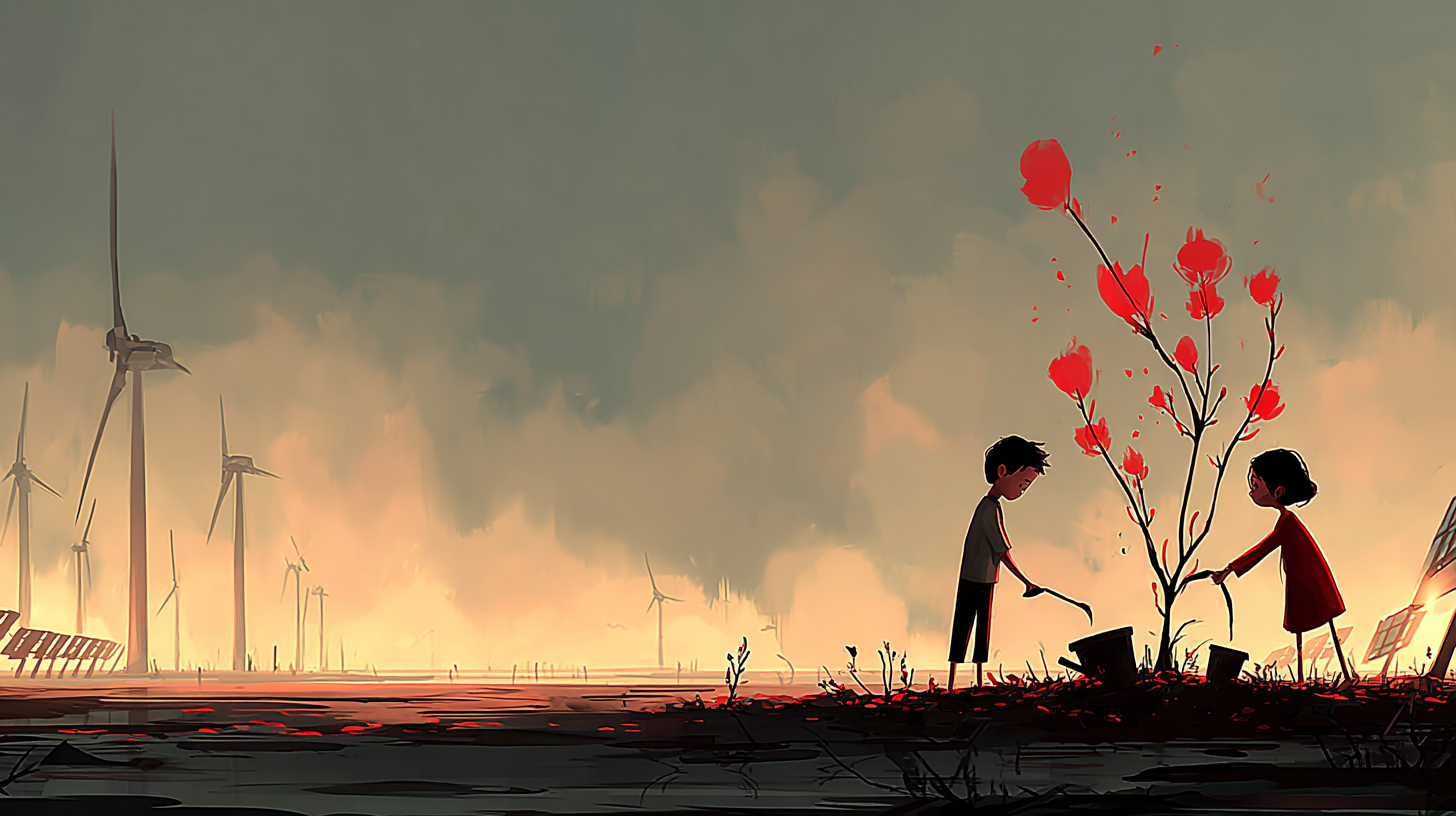“Generation” means a group of people born in the same period or the act of producing something.
「generation」は「世代」や「何かを生み出すこと」を表す
以下は英単語 “generation” に関するストーリー型学習コンテンツです。まずは大枠の意味を理解して最後の文章で確認しましょう。
主な意味(main meaning)
| 品詞 | 意味 | 発音記号 | 例文 |
|---|---|---|---|
| 名詞 | 世代(同じ時代に生まれた人々) | /ˌdʒɛnəˈreɪʃən/ | Many young people in this generation use smartphones every day. |
| 名詞 | 発生・創出(何かを生み出すこと) | /ˌdʒɛnəˈreɪʃən/ | The new machine allows the generation of clean energy. |
語源(etymology)
ラテン語 generare(生み出す、産む)に由来。
核イメージは「生み出すこと」「続いていくこと」。
類義語(synonyms)
| 類義語 | 意味 | 例文 |
|---|---|---|
| cohort | 同じグループの仲間 | Each cohort of students faces new challenges. |
| age group | 年齢層 | That TV show is popular among the younger age group. |
| production | 生産、創出 | The factory increased the production of cars this year. |
| creation | 創造 | The creation of this artwork took two months. |
反義語(antonyms)
| 反義語 | 意味 | 例文 |
|---|---|---|
| destruction | 破壊 | The storm caused the destruction of many homes. |
| end | 終わり | The end of the project was celebrated by the whole team. |
コロケーション(collocations)
| コロケーション | 例文 |
|---|---|
| young generation | The young generation is very familiar with digital devices. |
| future generation | We must protect nature for the future generation. |
| energy generation | Solar panels are used for energy generation. |
| generation gap | The generation gap sometimes causes misunderstanding. |
2項表現(binomials)
| 2項表現 | 例文 |
|---|---|
| life and death | The doctor fought between life and death to save the patient. |
| peace and war | History is full of stories of peace and war. |
英語ストーリー(english story)
Story:
At a modern office in Tokyo, Ms. Sato, a manager in her mid-thirties, was giving a presentation about the young generation of workers. “Our company has to understand the needs of this generation,” she said. “Many of them grew up with the internet, so communication styles are different. There is sometimes a generation gap, but it can be solved with better teamwork.”
Her colleague, Mr. Tanaka, added, “I agree. Each cohort of employees brings unique ideas. If we listen carefully, we can improve our projects.”
Later, they discussed the importance of the environment. “The future generation will suffer if we continue to pollute,” Ms. Sato explained. “That’s why we must increase clean energy generation. Solar power and wind power are examples.”
The team then reviewed a project about art and culture. One designer said, “The creation of this campaign took three months, but I believe it will reach a wide age group.” Another member added, “Yes, but we should also prepare for risks. While there is production, there can also be destruction if something goes wrong.”
Mr. Tanaka concluded the meeting by saying, “Every project is a struggle between life and death, or between peace and war in the business world. But if we think about the end result and work together, we will succeed.”
Everyone agreed, understanding that their work was not just for themselves but also for the future generation.
和訳
東京のある現代的なオフィスで、30代半ばの佐藤さんというマネージャーが、**若い世代(young generation)の社員についてプレゼンをしていました。
「私たちの会社はこの世代(generation)のニーズを理解しなければなりません」と彼女は言いました。「多くの人がインターネットとともに育っているので、コミュニケーションの仕方が違うのです。時には世代間のギャップ(generation gap)**がありますが、チームワークで解決できます。」
同僚の田中さんも加えて言いました。「その通りです。社員のそれぞれの**仲間の集団(cohort)**が独自のアイデアを持っています。しっかり聞けばプロジェクトを改善できます。」
その後、環境の重要性について話し合いました。「もし汚染を続ければ、**未来の世代(future generation)が苦しみます」と佐藤さんは説明しました。「だからこそ、クリーンなエネルギーの発生(energy generation)**を増やすべきです。太陽光や風力がその例です。」
チームは次に芸術と文化のプロジェクトを見直しました。あるデザイナーが言いました。「このキャンペーンの**創造(creation)には3か月かかりましたが、広い年齢層(age group)**に届くと思います。」別のメンバーが加えました。「はい、でもリスクも準備すべきです。**生産(production)があっても、問題が起きれば破壊(destruction)**もありえます。」
田中さんは会議を締めくくりました。「すべてのプロジェクトは、**生と死(life and death)の戦い、または平和と戦争(peace and war)のようなものです。しかし終わり(end)**の結果を考えて協力すれば、成功できます。」
全員が同意し、自分たちの仕事が自分たちだけのためではなく、**未来の世代(future generation)**のためでもあると理解しました。
Q&A
Q: 「generation」と「cohort」の違いは?
A: 「generation」は「世代」という広い意味で、ある時期に生まれた人々全体を指します。「cohort」はそれよりも小さなまとまりで、例えば「同じ学年の学生」や「同じ時期に入社した社員」など、特定の集団を指します。
Q: 「generation」と「age group」の違いは?
A: 「generation」は「世代」という時間的な区切りに注目します。一方で「age group」は「年齢層」という区分で、時間よりも「年齢の範囲」で人々をまとめます。例えば「teenagers(10代)」は「age group」としてよく使われます。
Q: 「generation」と「production」の違いは?
A: 「generation」は「生み出すこと」という意味もあり、エネルギーやアイデアを作り出すときに使います。「production」は特に「工場やシステムでの生産」を表し、物を大量に作るイメージが強いです。
Q: 「generation」と「creation」の違いは?
A: 「generation」は「自然や技術による発生・創出」も含みます。一方「creation」は「新しく作り出すこと」で、特に「芸術的なもの」や「独自のアイデア」を生み出すときに使います。
Q: 「generation gap」と「age group」の違いは?
A: 「generation gap」は「世代間の考え方の違い」を表します。「age group」は単に「年齢層」であり、そこに必ずしも対立や違いの意味は含まれません。
Q: 「future generation」と「young generation」の違いは?
A: 「future generation」は「これから生まれる世代」や「これから成長する人々」を指します。「young generation」は「すでに存在する若い世代」で、主に10代や20代を指すことが多いです。
Q: 「energy generation」と「production」の違いは?
A: 「energy generation」は「エネルギーを生み出すこと」、特に太陽光や風力発電などに使われます。「production」は「工業的に作ること」であり、エネルギー以外の物(車、食べ物、服など)を大量に作るときに使います。



コメント